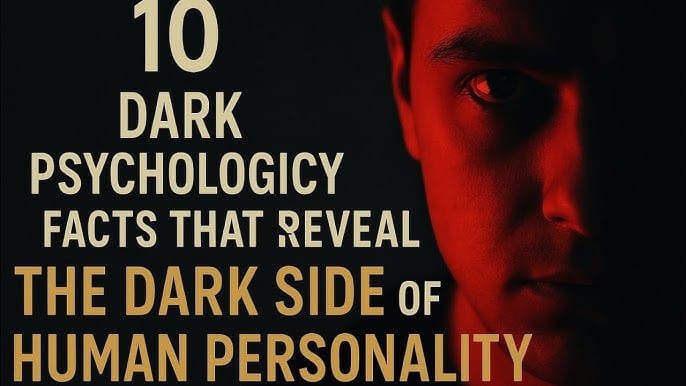- Human Psychology Facts
- Posts
- 10 Dark Psychological Facts About Human Personality
10 Dark Psychological Facts About Human Personality
Understanding the hidden forces shaping our behavior

Human nature is not just light and beauty. It also contains layers of shadows, instincts, and patterns that we often fail to notice or accept. These darker truths do not make us evil, but they do remind us that self-awareness requires honesty, even about the parts of ourselves we rarely acknowledge. Let’s explore ten psychological facts that reveal the more complex, sometimes uncomfortable aspects of human personality.
1. The Dark Triad of Personality
Some individuals display a combination of three personality traits known as the Dark Triad. These include Machiavellianism, narcissism, and psychopathy. People high in these traits are often manipulative, self-centered, and lack empathy. They may appear charming or intelligent, but behind the surface lies a pattern of using others for personal gain. Not every confident person is dangerous, but these traits are warning signs when combined.
2. Cognitive Dissonance Creates Mental Loopholes
Cognitive dissonance is a state of mental discomfort that arises when our actions do not align with our beliefs or values. Instead of correcting the action, the mind often adjusts the belief to reduce discomfort. This mental trick allows people to justify unethical or harmful behavior while still believing they are good and moral. It is how internal contradictions are quietly resolved without real change.
3. The Bystander Effect in Groups
In emergencies, people are often less likely to help when others are present. This is known as the bystander effect. The responsibility to act becomes diffused across the group, and each person assumes someone else will step in. As a result, many people freeze or avoid getting involved, especially in public spaces. This phenomenon highlights the importance of personal responsibility, even when surrounded by others.
4. Confirmation Bias Distorts Our Reality
Most people believe they are open-minded, but in reality, they tend to seek out information that supports their existing views. This is called confirmation bias. It creates mental blind spots, allowing people to ignore or reject evidence that challenges their beliefs. This bias is one of the main reasons arguments rarely lead to changed opinions and why misinformation can feel so convincing.
5. The Illusion of Control Over Randomness
Humans have a deep need to feel in control. This desire can lead to the illusion of control, where people believe they can influence outcomes that are actually random. Gamblers often feel a sense of certainty before placing a bet, and people develop rituals to try to affect unrelated events. This illusion can provide temporary comfort but may lead to risky or irrational decisions.
6. Moral Licensing Creates Ethical Imbalance
After doing something morally good, people may feel justified in acting unethically. This is known as moral licensing. For example, a person who donates to charity might feel entitled to lie or cheat without guilt. It becomes a mental trade-off, where one good deed gives permission for a later misstep. Over time, this creates a pattern of inconsistent behavior and self-deception.
7. Fear of Abandonment Drives Unhealthy Attachment
Some individuals develop deep fears of being left or rejected. This fear of abandonment can lead to overly dependent, clingy, or even manipulative behaviors in relationships. It often stems from unresolved childhood trauma or emotional neglect. While these individuals may seem controlling or overly emotional, they are often reacting to a deep, invisible wound.
8. Self-Serving Bias Protects the Ego
The self-serving bias is a mental habit where people credit their successes to their own abilities but blame failures on external circumstances. This bias helps protect self-esteem but also prevents personal growth. If every failure is someone else’s fault, there is little room for reflection or change. Awareness of this bias is key to developing emotional maturity and responsibility.
Schadenfreude is the experience of pleasure when others fail or suffer misfortune. It may arise when a rival stumbles or when someone seen as arrogant faces consequences. While it can be uncomfortable to admit, this feeling is often linked to insecurity, jealousy, or unresolved anger. Acknowledging it can lead to deeper emotional understanding and healing.
10. The Dunning-Kruger Effect and False Confidence
The Dunning-Kruger effect explains how people with low ability in a specific area often overestimate their competence. This happens because they lack the knowledge to recognize their own mistakes. Ironically, those who are truly skilled tend to doubt themselves more because they understand the complexity involved. This imbalance between confidence and ability appears in everyday conversations, workplaces, and leadership roles.
Becoming Aware of the Shadows
Understanding these psychological facts does not mean we are doomed by them. Instead, it gives us the power to observe, reflect, and change. Everyone carries aspects of these patterns in different ways. The goal is not to be perfect, but to be conscious. When we understand the hidden forces shaping our thoughts and behaviors, we can respond with greater empathy, honesty, and intention.
Awareness is the first step to transformation. Let the journey inward begin.